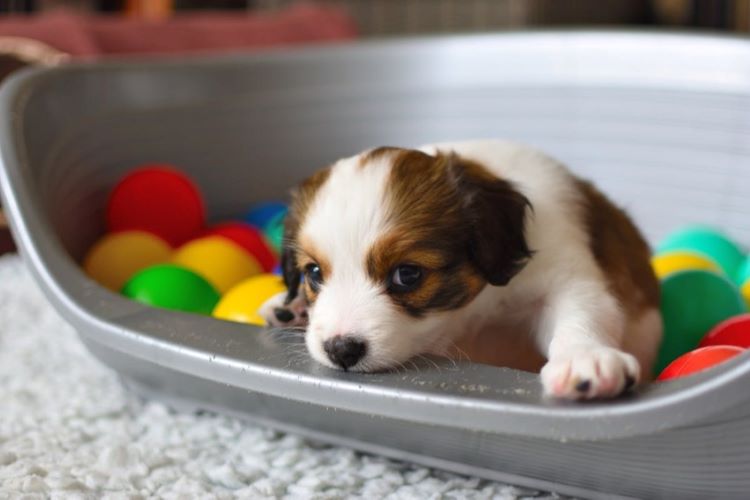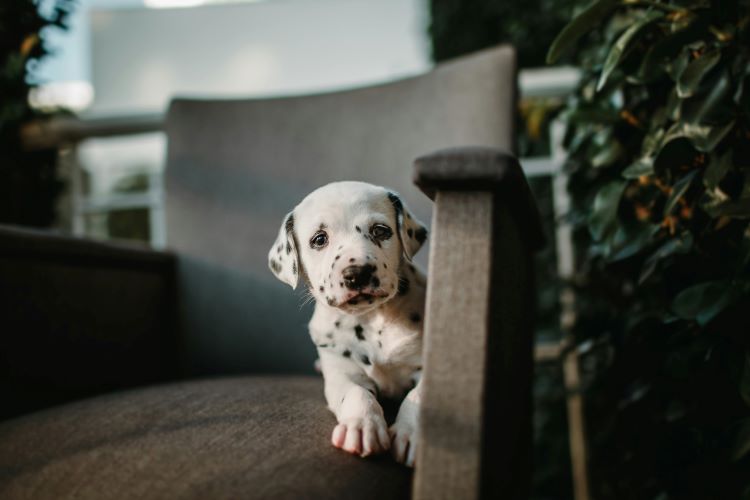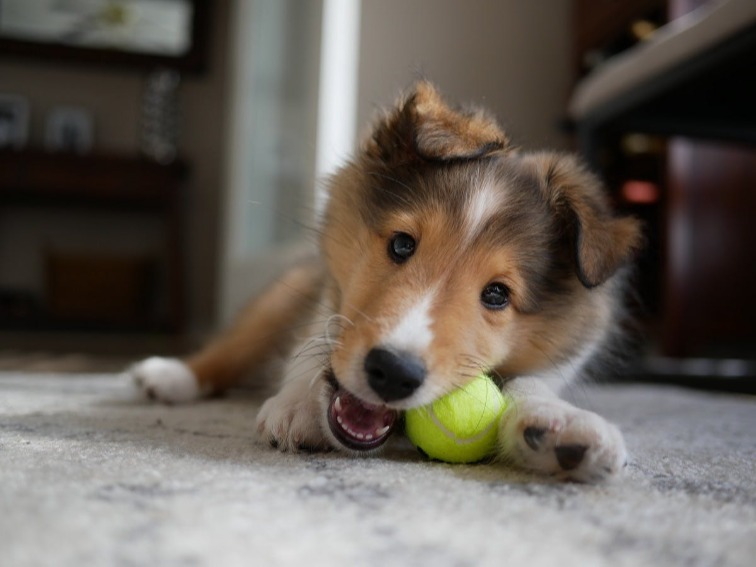Ready to help treat your pet to a healthy life?
Indoor Puppy Activities for Exercise & Enrichment
By : Kelli Rascoe & Trupanion Staff | Updated Oct 22, 2024

The weather's getting chillier, and the idea of taking your dog outside for long periods of time is getting less appealing. Obviously you'll still need to keep up with regular bathroom breaks, but even your dog probably isn't too happy about venturing out in uncomfortable weather. Their exercise is still important though, especially if they're a growing puppy. So, what do you do if you're finding that you're running out of activities for your furry friend? Indoor puppy activities, of course!
Just because you’re stuck indoors doesn’t mean there aren't ample opportunities for your puppy to learn. All dogs need regular physical and mental stimulation, but your puppy may need more interaction to keep them busy. If you're feeling stuck, we've got you covered with a quick guide to easy indoor activities for puppies.
The importance of puppy playtime
Your puppy grows quickly, and you don’t want to miss out on all those puppy firsts! It's important to take advantage of all the time you have with your growing pet, whether it's a romp around the park or playing indoors. Playtime is often a fun and exciting time for everyone involved. The right activities can relieve stress, pent up energy, and lessen anxiety. And for growing puppies, daily play helps with the following:
- Muscle development and bone growth
- Weight management (crucial for adult dogs too!)
- Immune support
- Cognitive development
- Confidence building
- Coordination
- Socialization
- Behavioral development (especially focus and patience)
Consider incorporating small play sessions throughout the day. It gives you and your best friend a chance to bond and play more frequently.

6 healthy indoor activities for puppies
Stuck inside? No problem! Indoor games are some of the best indoor activities for puppies because they can help with stimulation and provide training opportunities. Puppies are often eager to learn and explore, after all. They tend to get excited about everything because it's new, so use that to your advantage!
Try rotating activities from day to day that encourage your puppy to use different skillsets. From physical coordination to problem-solving, the best indoor puppy activities help your pup grow into a well-rounded dog. Of course, mixing things up can help keep you entertained as well.
1. Indoor scavenger hunt
Game time! Creating an indoor scavenger hunt for puppies is a fun way (for both of you) to engage curiosity and provide mental stimulation. Hide treats or favorite toys in various spots around your home, such as under cushions or behind furniture, encouraging your puppy to use their sense of smell and problem-solving skills.
Start with easy-to-find items and gradually increase the challenge as your puppy improves. This activity helps prevent boredom, reduces destructive behavior, and strengthens your bond. It’s also a great way to tire them out indoors, especially when outdoor play isn’t possible.
2. Agility course
Agility courses for puppies are fun, structured activities that promote physical and mental development. And they're customizable to any home and pet! You can make your own agility course with safe, low-impact obstacles like tunnels, small jumps, and weave poles. While it's obviously fun to encourage your pet to race through, the benefits here are helping your pet build coordination, balance, and strength while boosting their confidence. Agility training also enhances focus, as puppies learn to follow commands and navigate the course, fostering a strong bond between puppy and owner.
This type of exercise is a great outlet for their energy, reducing hyperactivity and boredom-related behaviors. However, it's important to keep sessions short and avoid high-impact elements to prevent injuries, as puppies' bodies are still developing.
3. Snuffle mat or puzzle feeder
Snuffle mats are engaging toys designed to stimulate a puppy's natural foraging instincts. Made of fabric strips where treats or kibble can be hidden, they provide mental enrichment by encouraging puppies to use their noses to search for food. This activity not only satisfies their curiosity but also helps reduce anxiety, boredom, and destructive behaviors.
Puzzle feeders operate similarly, though they're usually designed more around slowing down eating rather than being a game. Both can nevertheless promote healthier digestion and encourage puppy problem-solving. Additionally, they provide a low-impact form of exercise, perfect for puppies still developing physically.
4. Puppy hide and seek
Did you know a lot of pets love playing hide and seek? These games are also a great way to work on obedience training (more on this below) and problem solving. Simply have your puppy sit and stay, then go hide somewhere in the house and yell for them to come. As your puppy gets better with these skills, consider making things more challenging by hiding in increasingly difficult-to-find places.
In most cases, these games will involve you hiding and your pet seeking, though some highly trained dogs may be able to learn to hide on command.
5. Basic training
All puppies benefit from early training and learning new commands. Not only does this engage your dog's brain and help with cognitive development, but being responsive to basic commands is vital for your pet's safety. Some puppies will learn more easily than others and may be suitable candidates for advanced training, but all dogs — regardless of breed — should have the following covered early on:
- Knowing "sit," "stay," and "come"
- Leash training
- Crate training
- Potty training
- Safe socialization with other pets and people
6. Tricks and other training
Once your puppy has the basics covered, you might want to kick things up a notch. Try teaching tricks and more advanced training commands involving retrieval and physical actions. Many puppies can learn to bow, spin in circles, fetch different objects around the home on command, and much more! As with all good things, learning new skills takes time and patience, but it's often amazing how quickly puppies can pick things up.

Safety tips for indoor puppy play
Before you get started with any new indoor puppy activity, make sure you're keeping things safe. Even the tamest forms of play can quickly turn disastrous if you're not prioritizing safety for both you and your pet.
Always supervise playtime
Puppies are curious and may get excited to play. An overly excited puppy may accidentally nip during playtime. Always make sure to monitor your puppy, especially if you have other pets and kids at home.
Puppy-proof your home
For the safety of your best friend, be sure to puppy-proof your house. Be mindful of small objects that could easily be missed, like medication and properly store items like cleaning supplies, wires, food, and trash. Naturally, you don’t want your pet to get into something they shouldn’t.
Provide age-appropriate toys and treats
If you have other pets in your house, you may be tempted to let your puppy play with their toys. Although pet interaction with toys is encouraged, it’s important to be mindful of your puppy’s needs. One of the best indoor activities for dogs is simple: offer age-appropriate toys and treats in a safe indoor space to help with their development. For instance, puppy chew toys may help provide stimulation and curb behavior cues.
Know your puppy’s limits
Your puppy is full of energy, so it may be hard to tell when they need to rest. A balanced puppy is a happy puppy. Essentially, this means you should provide proper nutrition, exercise, play, and rest for your puppy on a daily basis. Take into consideration their age and breed, and give them time to recharge in between all of the fun indoor activities for puppies you have planned for your four-legged friend.
Be mindful of your puppy’s surroundings
With everyone home, your puppy may not have the space they normally do. While family time is essential, make sure your puppy has a pet-friendly area where they can rest. Also, be mindful of your puppy’s body language, they may be trying to communicate they need space.
Protect your puppy's health
Accidents can happen at any time, often when you least expect them. If you haven't already done so, it's a good idea to protect your pet with a good puppy insurance plan. Signing your dog up now will help ensure that you get the most out of their coverage throughout their lifetime.
